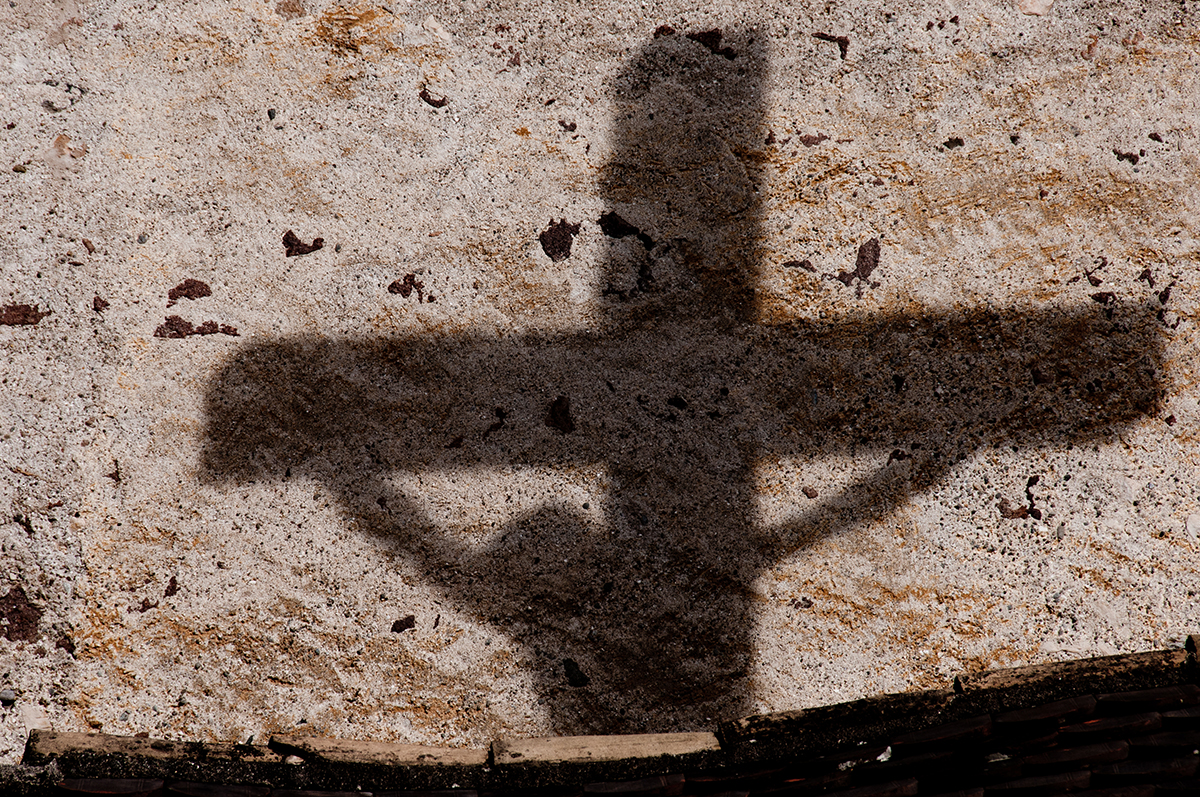
Few ironies could be greater than watching the trial of the Son of God unfold. On trial for what? And by whom? How was it possible that such a thing ever came to pass, and once it had occurred, how was it possible that the heavens did not crash and burn in cataclysmic destruction, or that the angels did not come in force to prevent such a travesty? Who was this Caiaphas to send Jesus to trial? Who was this Pilate to sentence Jesus to death?
The story should cause us to mourn for our sins that nailed him to the cross, and at the same time we should be moved to tears of joy that he willingly took that sin in himself that we might live with him forever. We shake our puny human fists at the Son of God, and as we do so, he takes our rebellion and turns it to our salvation by bearing the penalty for our sins in himself on the cross (Psalm 2). Dark day, glorious day, horrific day, joyful day.

Expository Bible-study guide to the second half of John's Gospel, showing how the surprising glory of the cross transforms Jesus' followers.
The hour of Jesus’ death draws nearer as the Jewish religious leaders take Jesus to Pilate, the Roman Governor (John 18:28). John notes an astonishing irony: they will not enter the Roman palace for fear of ceremonial uncleanness! These are men who have just aided and abetted in a serious miscarriage of justice in which all due process has been ignored, and they are now attempting to convince the pagan Roman Governor to do their dirty work for them—and they are worried about “ceremonial uncleanness”?! There’s none so blind as those who think they can see. We must be careful lest our external acts of obedience to God—going to church, being baptized, being a church member or on the electoral rolls of a church—are allowed to hide from us the truth of our internal sickness. True religion uncovers our disease so that it might be healed by Christ. We use false religion to cover up our moral failings for fear of looking bad to other people. Do not cover over your sins with pretense; honestly and openly confess your secret sins to God so that you might find forgiveness (1 John 1:9).
In John 18:29 Pilate accommodates the scruples of the Jewish leaders and comes out to see them outside his palace. “What charges are you bringing against this man?” he asks. For the first time a semblance of due process is being introduced, and it’s by a pagan. You cannot try a person in court, much less execute them, without first establishing what the charges actually are. Let it never be that secular due process is fairer than our religious proceedings or pronouncements. We of all people should honor the principle of innocence until proven guilty, as we remember our Master tried in this illegal way.
Be killing sin or it will be killing you
The Jewish leaders still remain unclear as to what Jesus’ crime actually is: “If he were not a criminal ... we would not have handed him over to you” (v 30). We will not clarify the charges, they say, but we will insist you do something because he is a criminal. We will put the onus on you without clarifying why he is here at all in the first place— but if he weren’t a criminal, we wouldn’t be here, would we? Weak arguments hide lies as surely as makeup can be used to hide blemishes. A good argument enhances the truth but does not disguise it.
Pilate, apparently unimpressed, wants to send Jesus back to them (v 31). They are all playing a deadly game of hot potato. Pilate does not want the responsibility; the religious leaders don’t either. But actually they are playing a worse game: hangman. The Jewish authorities want Jesus dead, but under Roman rule only Rome has the power to carry out capital punishment. Sin, as John Owen argued in The Mortification of Sin, will always work towards its final goal: to kill. With sin it is a case of kill or be killed. Be killing sin or it will be killing you. Here, the Jewish leaders’ sins of opposing the work of God, of pridefully resisting God’s Messiah, of wanting to hold on to their own religious power, of their fear of people, and of their legalistic self-righteousness, are all now coming to their natural head: murder—in particular, the murder of God. It is hard for us to be honest about it, but the sickness that we have in us is (as the nineteenth-century philosopher and theologian Soren Kierkegaard described it) a “sickness unto death.” There is no reasoning with it, in the end, for it is not rational. It is an animal seeking to devour us—and most of all to throw off God, to be done with him so that we might have liberty from his rule and run our lives the way we want them to be run, defining for ourselves a path beyond good and evil.
Why is all this happening? Has God lost the plot? No, this is all happening exactly according to plan (v 32). Jesus is the Master even at his own execution. The words that Jesus had spoken, indicating the way he was going to die, would be “fulfilled.” John is probably thinking of Jesus’ teaching to Nicodemus: that the Son of Man must be “lifted up,” meaning lifted up on the cross, so that “everyone who believes may have eternal life in him” (3:14-15). Jesus described his death this way several times in John (8:28; 12:32). Or John could be referring to the way Jesus predicted his death more generally: for instance, in 12:24. Whichever, the important point is that throughout the Bible, Jesus’ death is not viewed as a mistake, or something forced on Jesus by fate or circumstances or God the Father, but rather, something that is part of Jesus’ own plan for the salvation of all who believe. Only in Christianity is the death of the religion’s founder viewed in this way: planned, promised, and preached that we might believe and be saved. If Jesus so planned his death, we should so proclaim his death.
Our sins nailed Jesus on the cross, and God’s hand kept him there, and Jesus willingly went there
When we ask, “Who killed Jesus?” the answer in the biblical account is deliberately nuanced. Pilate, a representative of Gentiles, passed sentence. We might say that the Gentiles killed Jesus. The Jewish religious leaders, representatives of the Jewish people, urged that Jesus be killed. We might say that the Jewish religious leaders killed Jesus.
Any attempt to lay the blame for the death of Jesus solely at the door of either Jew or Gentile is utterly unbiblical and foreign to the account of John. Both Jew and Gentile are implicated.
But there is a further and in fact more profound nuance. According to John, all this was planned by Jesus himself (v 32). In the most important sense, then, we should say that Jesus killed Jesus. All this was God’s doing. As Joseph put it, when he confronted and forgave the brothers who had sold him into slavery in Genesis 50:20: “You intended to harm me, but God intended it for good to accomplish what is now being done, the saving of many lives.” Our sins nailed Jesus on the cross, and God’s hand kept him there, and Jesus willingly went there. While Barabbas, the rebel, was set free, the innocent substitute died in his place. Barabbas, whose name means “son of the father,” went free, while Jesus, the Son of the Father, died.
Samuel Crossman had it right:
They rise and needs will have
My dear Lord made away;
A murderer they save,
The Prince of Life they slay.
Yet cheerful He
To suffering goes
That He His foes
From thence might free.
(“My Song Is Love Unknown”)
This is an extract from John 13-21 For You. In the book, Josh Moody takes readers to the upper room with the disciples, to the cross with the Lord Jesus, and on to the empty tomb and the shores of Lake Galilee, showing at each point how gazing at the surprising glory of the God of the cross transforms his followers. This Expository Guide takes you verse by verse through the text in an accessible and applied way. Buy it here.